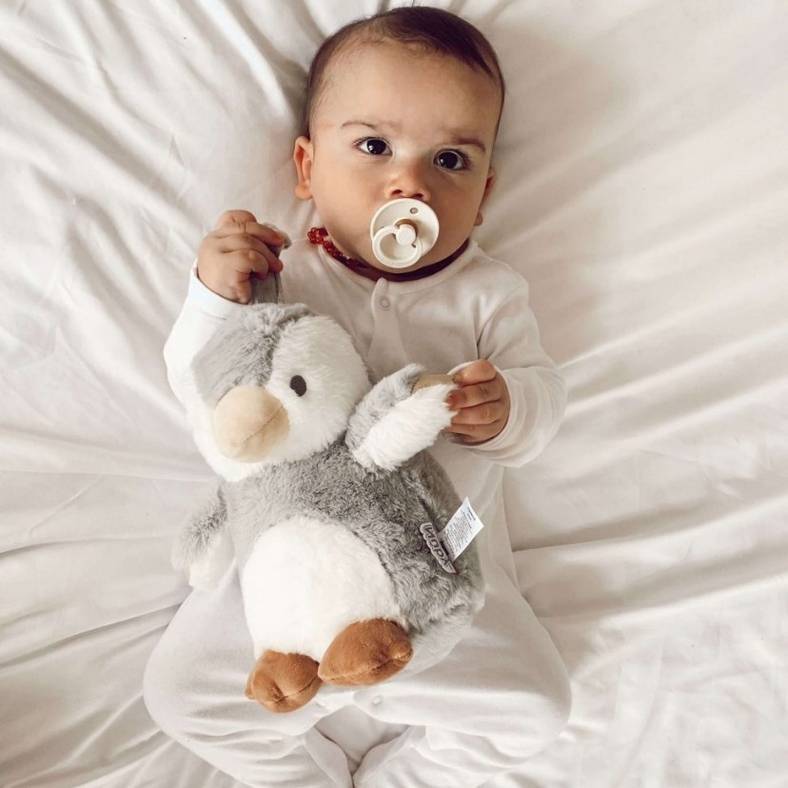Introduction
In the first month of any newborn’s life, sleep will be the unending task of every parent. On average, a newborn baby sleeps for approximately 14-17 hours in 24 hours, waking frequently. However, as your baby grows, they will learn that daytime is for being awake and nighttime is for sleeping. Parents will need patience, determination, but most of all compassion for themselves in order to power through this disruptive, and let’s face it, exhausting, time.

Remember…
As you grow increasingly sleep-deprived, you might become frustrated and question your abilities. So, the first thing we want any parent struggling with the unpredictable sleep routine of their baby to remember is: this is natural. This is not your fault. The early months are overwhelming for every new parent, and when you combine exhaustion with the emotional rollercoaster of becoming a parent, you are bound to end up questioning yourself and everyone around you.
Please don’t be hard on yourself. Whatever you’re experiencing right now, you’re doing great! Please believe in yourself and that your baby will get used to sleeping. In the meantime, here are some reasons why your baby might be keeping you awake and some advice on how to either support your sleep routine efforts or to help you survive a few sleepless months.
As Different as Night and Day
New parents are often warned that they will be left sleepless and exhausted in the early months of their baby’s life; however, this is entirely normal, according to What to Expect, Sleep. No one in your home is likely getting much of it, especially during the first few months. And even once your little one is sleeping through the night, baby sleep problems can still crop up from time to time.”
One reason for a disrupted night is your baby is unlikely to understand the difference between night and day in the early months of life. According to the NHS website, “it’s a good idea to teach your baby that nighttime is different from during the day.” This could include keeping the curtains open even when it’s nap time, playing games during the day and not at night, and maintaining the same level of noise during daytime naps as you would at any other time. Don’t be afraid to vacuum! Keep the noise up, so your child learns that noise is meant for daylight hours and peaceful quiet for the night.
You can also ensure that light is kept low at night, limit talking, keep voices down, and ensure the baby is down as soon as she’s been fed and changed. Don’t change your baby unless she needs it, and resist the urge to play at night.

Preparing For Sleep
Every parent has heard the term “sleep routine” but often is left despairing at their newborn’s apparent total disregard for the concept. It can take a while for your baby to settle into an effective sleep routine, and often babies only really begin to sleep more at night than the day when they’re approximately 10-12 weeks old.
Johnson’s recommends, “try regularly giving your newborn a warm bath, a gentle, soothing massage and quiet time before bed.” A warm bath is a tried and tested method, and after a few weeks, your baby will begin to recognise bathtime as an indication to get ready for bedtime. Avoid stimulating sounds and screens in the runup to bathtime, ensuring the TV is off and only relaxing music is playing. Your baby needs to recognise that a change is taking place, so every distinction should be made between daytime and nighttime in the transition to bathtime.
Settling To Sleep
Babies need to be placed on their back to sleep and not on their front where they might feel more comfortable, as sleeping on their front increases the risk of sudden infant death syndrome (SIDS).
We recommend swaddling your baby and providing a soother before putting her down at night to support her and make her feel safe. A sleep aid can also help when your baby wakes during the night by lulling her back to sleep with a lullaby, heartbeat, white noise, or gentle glow. Providing soothing sounds as she first drifts off has also been shown to encourage sleep, and many new parents opt for a background of white noise. We can also recommend using a cot mobile for added comfort, as your baby can gaze upwards at her fluffy friends as she either drifts into sleep or wakes in the night.

She will also be more likely to sleep when she is dry, warm and drowsy, and we also advise putting her down when she is sleepy but not already asleep. This means that she knows where she is when she wakes up and won’t panic. Maintaining a comfortable room temperature will also help your baby settle to sleep.
Take Care Of Yourself
Your baby won’t be sleeping consistently for a while, and you need to find a way to survive this period of parenting as best you can. Sleep when the baby is sleeping. It’s tempting to try and get things organised whilst you have a brief reprieve, but you’ll quickly burn out if you don’t prioritise your own sleep after your baby’s. Don’t worry if she wakes up at night unless she’s crying. She’s perfectly fine, and you should remain in bed getting some much needed Zs. Most sleep issues are temporary and related to different developmental stages, such as teething, minor illness, and changes in routine.
It’s very easy for us to ask you not to worry, but that is what we’re asking. Sleep is the first significant hurdle for every parent, and the best you can do is ride the wave until it passes. After a couple of months, nighttime feeding will begin to relax, and after 4-5 months, your baby should be sleeping around 11 hours a night.
There is light at the end of the tunnel, or should we say a sweet night of sleep.
Soothe your baby to sleep
Preparing For Sleep
Every parent has heard the term “sleep routine” but often is left despairing at their newborn’s apparent total disregard for the concept. It can take a while for your baby to settle into an effective sleep routine, and often babies only really begin to sleep more at night than the day when they’re approximately 10-12 weeks old.
Johnson’s recommends, “try regularly giving your newborn a warm bath, a gentle, soothing massage and quiet time before bed.” A warm bath is a tried and tested method, and after a few weeks, your baby will begin to recognise bathtime as an indication to get ready for bedtime. Avoid stimulating sounds and screens in the runup to bathtime, ensuring the TV is off and only relaxing music is playing. Your baby needs to recognise that a change is taking place, so every distinction should be made between daytime and nighttime in the transition to bathtime.
Settling To Sleep
Babies need to be placed on their back to sleep and not on their front where they might feel more comfortable, as sleeping on their front increases the risk of sudden infant death syndrome (SIDS).
We recommend swaddling your baby and providing a soother before putting her down at night to support her and make her feel safe. A sleep aid can also help when your baby wakes during the night by lulling her back to sleep with a lullaby, heartbeat, white noise, or gentle glow. Providing soothing sounds as she first drifts off has also been shown to encourage sleep, and many new parents opt for a background of white noise. We can also recommend using a cot mobile for added comfort, as your baby can gaze upwards at her fluffy friends as she either drifts into sleep or wakes in the night.
She will also be more likely to sleep when she is dry, warm and drowsy, and we also advise putting her down when she is sleepy but not already asleep. This means that she knows where she is when she wakes up and won’t panic. Maintaining a comfortable room temperature will also help your baby settle to sleep.
Take Care Of Yourself
Your baby won’t be sleeping consistently for a while, and you need to find a way to survive this period of parenting as best you can. Sleep when the baby is sleeping. It’s tempting to try and get things organised whilst you have a brief reprieve, but you’ll quickly burn out if you don’t prioritise your own sleep after your baby’s. Don’t worry if she wakes up at night unless she’s crying. She’s perfectly fine, and you should remain in bed getting some much needed Zs. Most sleep issues are temporary and related to different developmental stages, such as teething, minor illness, and changes in routine.
It’s very easy for us to ask you not to worry, but that is what we’re asking. Sleep is the first significant hurdle for every parent, and the best you can do is ride the wave until it passes. After a couple of months, nighttime feeding will begin to relax, and after 4-5 months, your baby should be sleeping around 11 hours a night.
There is light at the end of the tunnel, or should we say a sweet night of sleep.
Dummies to help keep the little ones calm day or night
Remember…
As you grow increasingly sleep-deprived, you might become frustrated and question your abilities. So, the first thing we want any parent struggling with the unpredictable sleep routine of their baby to remember is: this is natural. This is not your fault. The early months are overwhelming for every new parent, and when you combine exhaustion with the emotional rollercoaster of becoming a parent, you are bound to end up questioning yourself and everyone around you.
Please don’t be hard on yourself. Whatever you’re experiencing right now, you’re doing great! Please believe in yourself and that your baby will get used to sleeping. In the meantime, here are some reasons why your baby might be keeping you awake and some advice on how to either support your sleep routine efforts or to help you survive a few sleepless months.
As Different as Night and Day
New parents are often warned that they will be left sleepless and exhausted in the early months of their baby’s life; however, this is entirely normal, according to What to Expect, Sleep. No one in your home is likely getting much of it, especially during the first few months. And even once your little one is sleeping through the night, baby sleep problems can still crop up from time to time.”
One reason for a disrupted night is your baby is unlikely to understand the difference between night and day in the early months of life. According to the NHS website, “it’s a good idea to teach your baby that nighttime is different from during the day.” This could include keeping the curtains open even when it’s nap time, playing games during the day and not at night, and maintaining the same level of noise during daytime naps as you would at any other time. Don’t be afraid to vacuum! Keep the noise up, so your child learns that noise is meant for daylight hours and peaceful quiet for the night.
You can also ensure that light is kept low at night, limit talking, keep voices down, and ensure the baby is down as soon as she’s been fed and changed. Don’t change your baby unless she needs it, and resist the urge to play at night.


